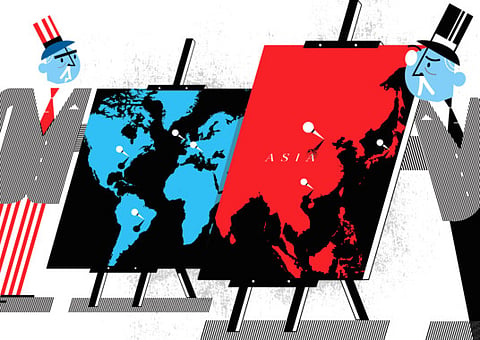The years of living tactically
Only by moving to the axis of strategy can we achieve the world we want

We have been living in an illusion. For years, the world has believed that the transition from a unipolar to a multipolar order would be peaceful, orderly and steady, with new players like China, Brazil and Turkey adapting to the existing multilateral framework in a natural, harmonious way. How wrong were we!
In fact, as the transition towards multipolarity has progressed, the international order has become increasingly unstable and tense. The 2008 global financial crisis compounded uncertainty and mistrust, disrupting key trends like globalisation. However, the biggest problem has been the failure of the developed countries — the architects of the post-Second World War international order — to formulate an inclusive strategy to address global challenges and manage the transition to a new international system.
The reason for this failure is simple: The West has allowed short-term tactical concerns to impede the development of a long-term strategic vision. This obsession with tactics has affected governance at all levels, from local administrations to supranational institutions, allowing major actors to operate within uncoordinated realities, without any shared goals guiding their decision-making.
To be sure, there have been some noteworthy exceptions, owing to concerted efforts to consolidate a constructive strategic vision. For example, western policy has yielded some progress towards a resolution regarding Iran’s nuclear programme. But, in other areas, strategic thinking has fallen short. In Ukraine, for example, the conflict has both exposed and widened the fissure between Russia and the West. Moscow’s struggle in the post-Soviet Russia era to integrate with the international order, together with its rejection of modernisation, have fuelled a revisionist nationalism based on spheres of influence.
And it is not just Russia that has turned its back on western modernity. The Middle East has been a hotbed of instability, fuelled by historical tensions since the fall of the Ottoman Empire almost a century ago. Now it is on fire — not least because the West’s repeated interventions have been guided by short-sighted tactical concerns.
Indeed, western leaders failed to anticipate the long-term consequences of supporting autocracies, as revealed in the Arab Spring revolts, or to foresee the impact of successive military interventions in Iraq, Syria and Libya. As a result, nostalgia for the “glorious” past — such as Daesh’s (Islamic State of Iraq and the Levant) ‘caliphate’ envy — is proliferating in the Middle East, too. The West was not prepared for global forces to push backward and to seek a future in the past. In any case, the Middle East must be allowed to take ownership of solutions to the challenges it faces. After all, no externally imposed solution has worked so far. The responsibility of the rest of the world is to build a stable backdrop for such efforts: An inclusive international system in which countries abide by the same rules and norms.
In managing the transition towards multipolarity, the West’s greatest challenge lies in Asia — a region that is simultaneously dynamic and future-oriented and hampered by historical tensions and divides. Recognising Asia’s profound importance to the new world order, US President Barack Obama announced a strategic “pivot” toward the region in 2012. But western leaders have hesitated to integrate China, Asia’s most economically formidable actor, into the international system. Indeed, the last meeting of the International Monetary Fund — which recognised China as the world’s largest economy in terms of purchasing power parity — concluded without increasing China’s share of votes. To put this in perspective, China was left with a slightly higher proportion of votes than Italy, whose economy is one-fifth the size and just one-quarter of America’s vote share.
Moreover, the West has relegated support for the creation and strengthening of regional frameworks for cooperation in key areas like security to secondary importance. Unlike Europe, Asia’s wounds from Second World War never healed. As a result, territorial disputes and nationalist claims remain a potent threat to regional — and indeed global — stability. But, for the West, applying long-term vision requires more than recognising the imperative of strategic decision-making. It also demands efforts to revitalise polarised and dysfunctional domestic political systems. In the US, there is no question that the lack of strategic vision displayed in Obama’s foreign policy is at least partly a result of his need to navigate a defective system.
For its part, the European Union has pursued shortsighted policies to address its economic challenges, without anticipating — or acknowledging — the social and political consequences, including the proliferation of anti-EU sentiment. Member states’ tactical approach to their particular problems (often defined by their status as creditor or debtor) has left the EU bereft of credible leadership and a unified vision. A more strategic approach would focus on boosting growth throughout the EU, such as by meeting the Europe 2020 targets for research, development and innovation and advancing the Transatlantic Trade and Investment Partnership.
Tactics are short-term solutions that often have significant unforeseen consequences, making it impossible to predict the kind of world they will generate. Strategy forms a different axis of action, accounting for the structure of global interdependence and thus how individual changes may affect the entire system. Only by moving to this axis of strategy can we achieve the world we want: One that is habitable, stable, free and prosperous.
— Project Syndicate, 2014
Javier Solana was European Union high representative for Foreign and Security Policy, secretary-general of Nato and foreign minister of Spain. He is currently president of the ESADE Center for Global Economy and Geopolitics and Distinguished Fellow at the Brookings Institution.



